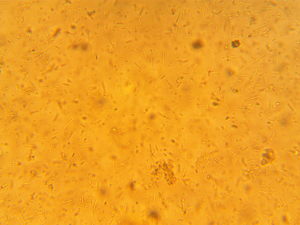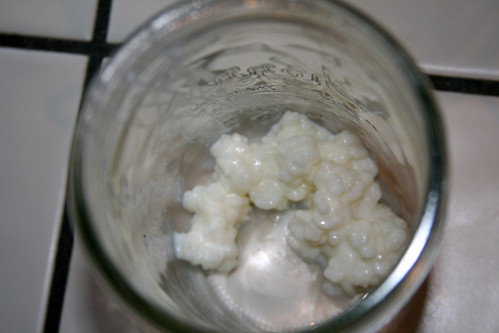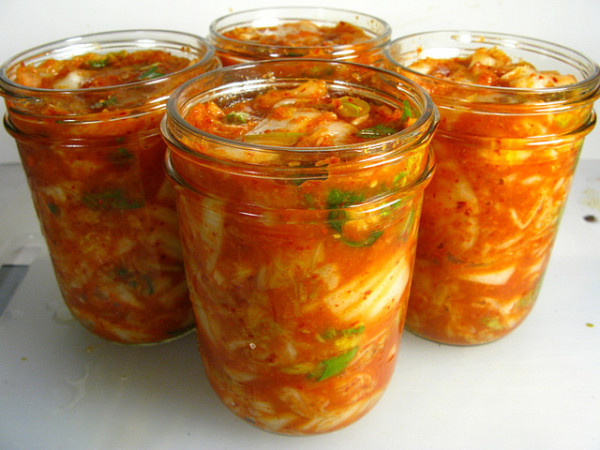A Bit about Fermented Foods and their History.
Ferment your own veggies - kitchen-sessions
So what are fermented foods?
The short answer is pretty simple and quite funny – according to Sandor Katz, author of The Art of Fermentation, fermented foods are “the flavorful space between fresh and rotten.” That doesn’t sound very tasty does it? But take note, most highly prized gourmet foods are fermented ones because the process of fermentation creates very strong flavors.
The process of fermenting foods isn’t a new one: Evidence indicates that early civilizations were making wine and beer between 7,000 and 8,000 years ago — and bread even before that. If you think about it – most cultures have their own version of fermented cabbage or sauerkraut – European sauerkraut, Korean Kimchi, Latin Cortido and the list goes on and on.
These people developed these techniques out of necessity to preserve their foods for long periods of time without the use of refrigeration or canning methods. This process is actually called ‘lacto-fermentation’. According to the Nourishing Traditions cookbook, “lactic acid is a natural preservative that inhibits putrefying bacteria. Starches and sugars in vegetables and fruits are converted to lactic acid by the many species of lactic-acid-producing bacteria or lactobacilli.”
What are fermented foods benefits?
The fermentation of dairy products and the preservation of vegetables and fruits actually have benefits beyond simple preservation. The proliferation of lactobacilli in fermented foods enhances their digestibility and increases vitamin levels. Numerous helpful enzymes are produced as well as antibiotic and anticarcenogenic substances. These bacteria promote the growth of healthy bacteria or flora throughout our intestines. Again according to Sandor Katz, “Bacteria in our gut enable us to live. We could not survive without bacteria. … They allow us to digest food, to assimilate the nutrients in our food; and they play a huge role, just beginning to be understood, in our immune functioning and in many other processes in our bodies. All life has evolved from bacteria and no other form of life has lived without bacteria. … Our bacteria perform all sorts of essential functions for us, and because we are continually attacking them effectively with all of these chemicals in our lives, simply replenishing and diversifying these populations has a benefit for us.”
Lactobacillus
 Recent research called the Human Microbiome Project being done at the same scale as the Human Genome Project is telling us more and more about how we co-exist (and frankly would not exist) without bacteria living in our bodies. The study has discovered “more strains than they had ever imagined — as many as a thousand bacterial strains on each person. And each person’s collection of microbes, the microbiome, was different from the next person’s. To the scientists’ surprise, they also found genetic signatures of disease-causing bacteria lurking in everyone’s microbiome. But instead of making people ill, or even infectious, these disease-causing microbes simply live peacefully among their neighbors.” The work also helps establish criteria for a healthy microbiome, which can help in studies of how antibiotics perturb a person’s microbiome and how long it takes the microbiome to recover. So what are fermented foods affects on the microbiome? This type of research tells us that eating fermented foods keeps our bodies and our immune systems fine tuned and healthy.
Recent research called the Human Microbiome Project being done at the same scale as the Human Genome Project is telling us more and more about how we co-exist (and frankly would not exist) without bacteria living in our bodies. The study has discovered “more strains than they had ever imagined — as many as a thousand bacterial strains on each person. And each person’s collection of microbes, the microbiome, was different from the next person’s. To the scientists’ surprise, they also found genetic signatures of disease-causing bacteria lurking in everyone’s microbiome. But instead of making people ill, or even infectious, these disease-causing microbes simply live peacefully among their neighbors.” The work also helps establish criteria for a healthy microbiome, which can help in studies of how antibiotics perturb a person’s microbiome and how long it takes the microbiome to recover. So what are fermented foods affects on the microbiome? This type of research tells us that eating fermented foods keeps our bodies and our immune systems fine tuned and healthy.
It also tells us that we need many different types of bacteria to keep our microbiomes healthy. You have probably already been hearing about the benefits of probiotics and many food products claim to have probiotics in them. You have also probably taken a probiotic pill before. While there might be some benefit (vs. doing nothing at all) to eating these types of products, they only cover a very small slice of the types of health promoting bacteria in our microbiomes. They are not the varied types of bacteria you can produce in lacto-fermentation. Scientists have even started naming these varied types of probiotics after the food they exclusively exist in – take for example kimchi – scientists named the bacteria found in kimchi – lactobacillus kimchii.
Kimchii
What are the dangers of not eating fermented foods?
Without these enzymes and bacteria we are basically eating ‘dead food’. Making fermented foods is an artisanal craft and results can be inconsistent – this doesn’t jive well with industrial food where food products are created on a massive scale and need to be uniform. We have had many decades where this craft is being lost and people are taking antibiotics and totally messing up their intestinal gut flora. I personally struggled for many years with what doctors told me was IBS (Irritable Bowel Syndrome) which is one of those ‘syndromes’ that doctors name when they have no idea why you have symptoms and they have no drugs to help your symptoms. What are fermented foods doing for my body? I believe by not eating fermented foods and by killing off good bacteria in my body through antibiotic use, I was allowing much worse bacteria to proliferate causing my personal microbiome to get out of balance.
What are fermented foods flavor profiles?
All of the science aside, I see another really amazing benefit of perfecting your own craft of making fermented foods at home. One of my new favorite cookbooks is The Flavor Bible. It is basically a ‘foodie’ chef handbook on which kinds of flavors go together well – it isn’t a book a recipes – it is a book that allows for individual creativity in creating flavor profiles. According to the book, we technically have only four (or five depending on who you ask) flavor profiles: salty, sweet, sour, bitter and a recent addition to the list, umami (savoriness – think anchovies, blue cheese, or rich broth). We all know about salty, sweet and bitter foods. But when was the last time you thought about sour foods? What comes to my mind when I think of sour is lemons or sour candy. We just don’t eat that many sour foods anymore and we have forgotten what they taste like. The sour type of taste is described in the book as “second only to salt in savory food and sugar in sweet food in it’s importance as a flavor enhancer. Sour notes – whether a squeeze of lemon or a drizzle of vinegar – add sparkle and brightness to a dish. Balancing a dish’s acidity with its other tastes is critical to the dish’s ultimate success.”
The longer you ferment the vegetable and the type of vessel used changes your result – different flavors, textures and apparently optimized growth of probiotics. With regular visits to my daughter’s plate of sauerkraut and sour pickles, she has learne
Fermented foods: Sauerkraut
According to Nourishing Traditions, “among all of the vegetables that can conserve through lacto-fermentation, cabbage has been man’s preferred choice. In China, they fermented cabbage 6000 years ago. In ancient Rome, sauerkraut had a reputation as a food that was easy to digest. Tiberius always carried a barrel of sauerkraut with him during his long voyages to the Middle East because the Romans knew that the lactic acid it contained protected them from intestinal infections.” Sauerkraut also owes its reputation to famous navigators of past centuries. It was taken on long voyages and prevented scurvy in the crew because it preserved sufficient quantities of vitamin C
.
Fermented foods: Pickles
The first time I experimented with a lacto-fermented sour pickle recipe, I was pleasantly surprised to taste what was basically a Jewish deli pickle. I couldn’t believe it. These type of pickles are far less acidic than pickles made with vinegar. It is a very wise habit to eat these type of pickles with preserved meats (like corned beef or pastrami!) because it is “able to dissolve precipitates of uric acid and thus prevents the formation of stones, often caused by meats and sausages, foods rich in uric acid” – Claude Aubert Les Aliments Fermentes Traditionnels.
Fermented foods: Condiments
Ketchup is a great example of a food that was formerly fermented and therefore health promoting, but whose benefits were lost with large scale production (namely giving it a sweet flavor profile to mask what was lost – a very beautifully balanced sour and umami taste). This is again according to the
Nourishing Traditions cookbook, ” the word ‘ketchup’ derives from the Chinese Amoy dialect ke-tsiap or pickled fish brine or sauce, the universal condiment of the ancient world. The English added foods like mushrooms, walnuts, cucumbers and oysters to this fermented brew; Americans added tomatoes from Mexico to make tomato ketchup. Americans consume one-half billion bottles of ketchup per year. The chief ingredient of the modern version, after tomatoes, is high fructose corn syrup.”
Fermented foods: Kefir

Kefir is believed to have its origins in the Caucasian mountains of the former USSR. Since then, it has become a popular food and drink in Russia, in Eastern Europe and in many parts of the world. How is kefir different than yogurt? Both kefir and yogurt are cultured milk products. Kefir has the advantage because it actually colonizes the gastro-intestinal tract. Yogurts merely have transient bacteria that provide food for the good bacteria that live in the intestinal tract. Kefir has a long list of symbiotic-type naturally-occurring beneficial bacteria and yeasts – about 35 of them – a great advantage over the laboratory-grown bacteria for yogurt which has only 1 strain to about 5 strains of bacteria or store bought kefir which only contains 10 strains. Several beneficial bacteria and yeasts found in kefir that flush out destructive pathogenic yeasts in our body are not present in yogurt. I will explore more about kefir in the second installment of this series: ‘what are fermented foods?’

Kefir is believed to have its origins in the Caucasian mountains of the former USSR. Since then, it has become a popular food and drink in Russia, in Eastern Europe and in many parts of the world. How is kefir different than yogurt? Both kefir and yogurt are cultured milk products. Kefir has the advantage because it actually colonizes the gastro-intestinal tract. Yogurts merely have transient bacteria that provide food for the good bacteria that live in the intestinal tract. Kefir has a long list of symbiotic-type naturally-occurring beneficial bacteria and yeasts – about 35 of them – a great advantage over the laboratory-grown bacteria for yogurt which has only 1 strain to about 5 strains of bacteria or store bought kefir which only contains 10 strains. Several beneficial bacteria and yeasts found in kefir that flush out destructive pathogenic yeasts in our body are not present in yogurt. I will explore more about kefir in the second installment of this series: ‘what are fermented foods?’
Back to our original question: What are fermented foods and are they beneficial?
The conclusion is clear. Fermented foods are highly beneficial. Fermented foods are traditional, natural and provide us with the probiotics and enzymes we need to function.
Ferment your own veggies














No comments :
Post a Comment